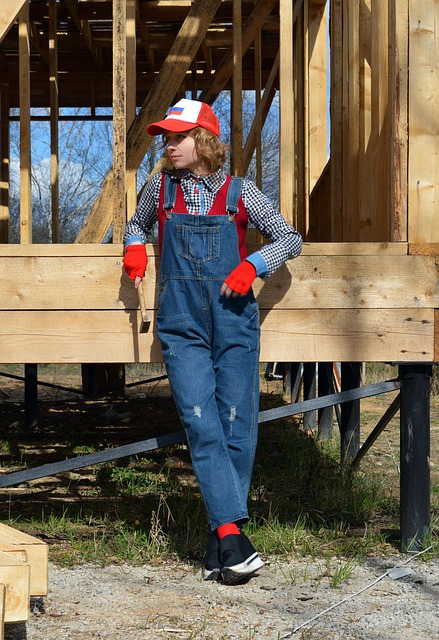Regular inspections are key to identifying early signs of foundation issues, such as cracks, uneven floors, or water damage, which can save costs and prevent severe structural damage. Professional assessments using advanced tools offer tailored solutions for problems like settlement, mold growth, and pest infestations. By maintaining the foundation through simple measures and addressing issues promptly, homeowners can protect their investment and ensure a safe living environment, emphasizing the importance of Residential Foundation Repair.
“Discovering the health of your home’s foundation is crucial for any homeowner. This comprehensive guide delves into the essential practice of affordable residential foundation inspection, a key step in maintaining your property’s value. Learn to identify signs that indicate your home may need critical repair, and explore the benefits of early detection. From understanding basic repairs to common issues and post-inspection care, this article equips you with knowledge on navigating the world of residential foundation repair.”
Understanding Residential Foundation Repair: The Basics

The foundation of a home is its backbone, supporting the entire structure and ensuring stability. When it comes to residential foundation repair, understanding the basics is essential for homeowners. This involves recognizing common issues like cracks in concrete, uneven floors, or doors that stick—all potential indicators of foundational problems.
Regular inspection is key; many issues are easier and more affordable to address early on. Prompt action can prevent minor repairs from turning into costly, complex projects. By staying informed about residential foundation repair methods and maintaining regular check-ups, homeowners can protect their investment and ensure a solid, safe living environment.
Signs Your Home Needs a Foundation Inspection

If your home is showing signs of structural stress or instability, it might be time to consider a foundation inspection. While regular maintenance and care can help extend the lifespan of your residential foundation repair needs, certain issues require professional attention. Here are some indicators that your property could benefit from an expert assessment:
1. Visible Cracks: Any visible cracks in your home’s foundation walls, floors, or ceilings should not be ignored. These cracks, especially those wider than a finger, can signal structural problems and potential signs of settling or shifting.
2. Uneven Floors or Walls: If you’ve noticed that floors are uneven or walls have developed noticeable bulges or dips, this could point to foundation issues. Such deformities might indicate stress on the structure, requiring immediate attention from residential foundation repair experts.
3. Doors and Windows that Stick or Don’t Close Properly: Inconsistent door and window alignment is another red flag. This issue often arises due to soil settlement around the foundation, which can lead to structural damage over time if left unaddressed.
4. Water Damage or Moisture Problems: Foundation problems often manifest as water intrusion or persistent moisture issues. Leaks, flooding, or areas of excessive humidity could indicate weak spots in your home’s foundation that need assessing by professionals.
Benefits of Early Foundation Repair Detection

Early detection of foundation issues through regular inspections is a game-changer for homeowners, offering numerous advantages in the realm of residential foundation repair. By identifying problems at their nascent stages, homeowners can avoid more extensive and costly repairs later. Cracks, settlement, or uneven floors may seem insignificant when first noticed but could indicate serious structural damage if left unaddressed. Prompt action ensures that minor issues are corrected before they escalate into major structural complications, which can be both expensive and time-consuming to rectify.
Moreover, early detection allows for more effective and affordable residential foundation repair. Minor adjustments and repairs are generally less disruptive and less costly than extensive underpinning or foundation replacement. It also provides homeowners with peace of mind, knowing their home’s structural integrity is maintained, potentially preventing significant financial losses in the long run.
Types of Affordable Foundation Inspection Services

When it comes to affordable foundation inspection services, there are several options tailored for homeowners seeking reliable and cost-effective solutions. One popular choice is the visual inspection, where a professional inspects the exterior and interior of a residential property, looking for signs of damage or potential issues. This method provides a quick overview but may not uncover deeper problems.
For more comprehensive assessments, structural engineers offer advanced non-destructive testing methods such as moisture meter readings, camera inspections, and even thermal imaging to detect hidden defects in the foundation walls. These services are particularly beneficial for identifying issues related to Residential Foundation Repair, ensuring that any necessary repairs are addressed efficiently and affordably.
What to Expect During an Inspection Process

During an affordable foundation inspection, a professional will thoroughly examine your home’s basement or crawl space to assess the overall health and stability of your residential foundation repair. They’ll look for any signs of structural damage, cracks in the foundation walls, uneven floors, and other potential issues that could indicate a deeper problem.
The inspector will use various tools and techniques, such as moisture meters, level transits, and non-invasive testing methods, to gather data and create an accurate picture of your foundation’s condition. They’ll also take note of any visible water damage, mold growth, or signs of pest infestation, which can contribute to foundation problems. This comprehensive evaluation will help identify both immediate concerns and potential future issues, allowing you to make informed decisions regarding necessary residential foundation repair.
Common Issues Found in Residential Foundations

Residential foundations are a crucial component of any home’s structural integrity, but over time, they can develop various issues that require attention. Common problems include cracks in the foundation walls, which can be caused by shifting soil, poor initial construction, or settlement. These cracks may seem minor at first but can progressively widen, leading to serious structural damage if left unattended. Another frequent issue is uneven floors, where gaps or slopes form due to differential settling of the soil or unforeseen underground obstructions.
Water intrusion is yet another prevalent concern, often resulting from inadequate waterproofing or cracks that allow moisture to penetrate. This not only leads to visible damage but also fosters mold growth and can cause serious health issues for residents. Foundation heaving, where parts of the foundation rise due to expansive clay soils drying and contracting, is a common problem in certain climates, leading to significant structural stress. Prompt identification and addressing these issues through residential foundation repair methods are essential to maintain the home’s value and ensure the safety of its occupants.
Maintenance Tips for Post-Inspection Care

After a foundation inspection, proper maintenance is crucial for preventing future issues and costly repairs. One effective strategy is to regularly check for any signs of damage or movement in your home’s structure. This includes observing cracks in walls, floors, or ceilings, as well as monitoring uneven floors or doors that don’t close properly. Addressing these issues promptly can prevent them from escalating into more serious problems requiring residential foundation repair.
To keep your home’s foundation in top condition, consider implementing a few simple maintenance tips. Regularly inspect and clean rain gutters to ensure proper water drainage, preventing moisture buildup around the foundation. Also, maintain adequate humidity levels inside your home by using dehumidifiers if necessary, as excessive moisture can contribute to foundation damage. Lastly, be mindful of tree roots near your property, as they can exert pressure on underground structures, leading to potential foundation problems over time.
